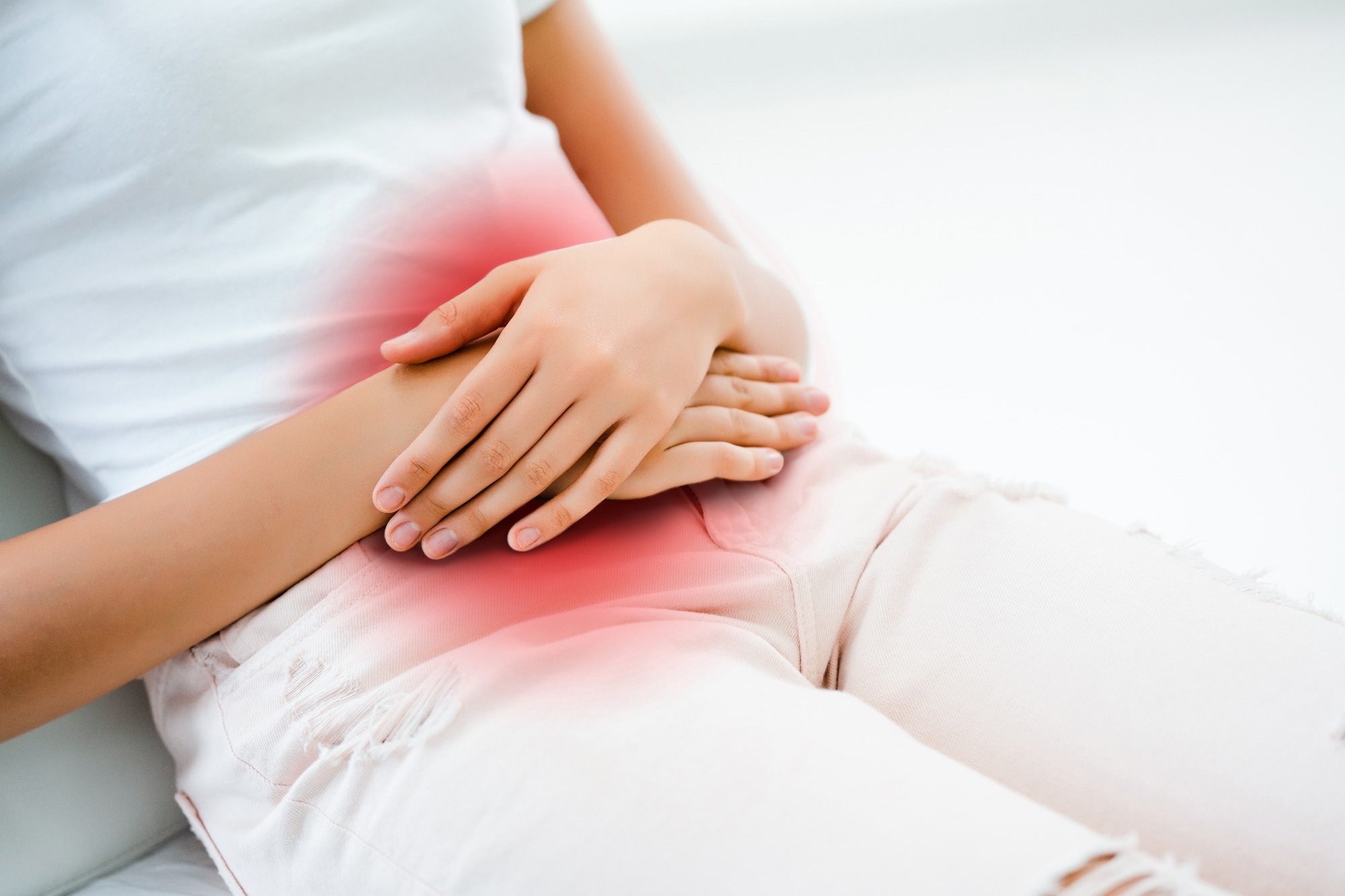In a recent study published in the Journal of Clinical Medicine, researchers reviewed available literature on cannabis as a self-management strategy in the treatment of pain arising due to endometriosis. They further investigated the mechanisms by which cannabis interacts with the endocannabinoid system (ECS) and the interactions of gut microbiota and ECS in treating the condition. Their findings reveal that cannabis-derived endocannabinoids have a protective effect on the gut, decrease gut inflammation, and improve its permeability. This, in turn, suppresses bloating, the most common endometriosis symptom. Cannabinoids further inherently suppress pain receptors and serve as a natural painkiller. These results highlight gut microbiota and the ECS as future clinical trial targets in the fight against endometriosis.
Study: Cannabis and Endometriosis: The Roles of the Gut Microbiota and the Endocannabinoid System. Image Credit: Rapeepat Pornsipak / Shutterstock
Endometriosis and the benefits of cannabis
Endometriosis is a disease in sexually mature women (between the first period and until menopause) characterized by uterus lining-like tissue growing outside the confines of the uterus. It is a common condition, estimated to affect 10% of all women, with symptoms including severe pelvic pain and outcomes including difficulties conceiving.
In addition to its direct outcomes, endometriosis-related chronic pelvic pain (CPP) has been associated with several comorbidities including irritable bowel syndrome (IBS), psoriasis, rheumatoid arthritis, mental health issues (depression and anxiety), and chronic fatigue syndrome. The annual economic loss due to the disease is estimated at between USD 1,459 and USD 20,239 per woman, highlighting the socioeconomic burden of the disease alone, not accounting for its treatment.
Research has identified progesterone as a common characteristic of endometriosis patients, suggesting hormone imbalances that subsequently trigger inflammation due to the local infiltration of immune cells. These cells establish new cells, which have been found to activate pathways associated with invasion, proliferation, metastasis, and angiogenesis. Since most hormone resistances arise due to imbalances within the gut microbial system, resulting in changes in expression levels of estrogen-metabolizing enzymes, recent studies have focused on the associations between the gut microbiome and the disease.
Current treatment for endometriosis involves a combination of surgical intervention and hormone treatment. Anti-neuropathics, including gabapentin, pregabalin, and amitriptyline, are used to reduce pain and allow for normal daily functioning. Unfortunately, these interventions are medically suboptimal given the reduced access of women in developing and underdeveloped countries to surgery and the much-reduced efficacy of anti-neuropathics in suppressing pain in endometriosis patients. Research has presented that endometriosis patients are four times more likely to overuse painkillers, thereby developing dependency and abuse conditions.
Metabolites from the Cannabis genus received extensive attention during the 1990s, resulting in the discovery of the endocannabinoid system (ECS), a complex signaling system composed of G-protein-coupled cannabinoid receptors, ion channel transient receptor potential vanilloid 1, and a cohort of enzymes responsible for endocannabinoid synthesis and catabolism. Cannabidiol (CBD) and tetrahydrocannabinol (THC), the two main active ingredients derived from cannabis consumption, have intrinsic pain suppression abilities and have been used in other medical research.
Given its relative inexpensiveness and ease of access, cannabis consumption has become a popular self-medication against endometriosis pain despite sufficient research into the pathways and mechanisms through which it may affect the ECG, thereby positively- or negatively altering endometriosis outcomes.
Study findings
The present study is a descriptive review of current scientific knowledge on endometriosis, focusing on the impacts of endocannabinoids on disease outcomes and the associations between ECS, gut microbiota, and endometriosis. While publication screening methodologies have not been reported, the list of citations suggests that over 140 scientific papers were perused during the synthesis of this work.
Research has identified that the ECS is primarily involved in pain modulation and inflammation suppression. Endocannabinoids or exogenous cannabinoids have been shown to activate the CB1 and CB2 receptors, critical components of the G-protein-coupled system, thereby suppressing nociceptive processing and inducing analgesia.
“In a prospective randomized placebo-controlled trial, smoked cannabis (3.56% delta-9-tetrahydrocannabinol (THC)—participants smoked three cigarettes daily over a 4-day period) reduced daily pain experienced by adults with HIV-associated sensory neuropathy.”
ECS is further hypothesized to play a central role in endometriosis pathology, with some researchers referring to the disease as an “endocannabinoid deficiency.” Strong correlations have been observed between circulating endocannabinoid levels in the plasma and the severity of endometriosis, with lower levels of endocannabinoids associated with increased pain. However, other studies have suggested that endometriosis and the ECS may have complex associations with the onset of the former initiating a feedback loop in the latter. This indicates that the role of ECS in endometriosis may extend beyond inflammation- and pain suppression and warrants further research into the mechanisms underlining these interactions.
Can external cannabis consumption help?
The role of cannabis derivatives in endometriosis, especially concerning their pain suppression capabilities, has spurred examinations of cannabis use as a potential natural alternative to current anti-neuropathic therapies. An ongoing clinical trial is testing the efficacy of CBD isolate oil and vaporized THC in pain modulation for women admitted to hospitals and clinics reporting severe endometrial pain. Murine in vivo models have paved the way for these types of trials, given the positive effects of CBD against not only endometrial pain but also their observed growth retarding effects on the surface area of endometriotic implants.
These promising findings highlight the potential therapeutic benefits of CBD and THC for endometriosis-associated pain, warranting the need for human studies.
What about gut microbiota?
The gut forms a part of the ECS, and enzymes secreted by the gut have been shown to significantly alter ECS hormones, thereby potentially having a regulatory effect on endometriosis. However, research into this field remains at its nascent stage. Thus far, findings suggest a bidirectional relationship between gut microbiota, the ECS, and endometriosis, thereby influencing both the risk and severity of the disease.
“Endocannabinoids and exogenous cannabinoids exert opposite effects on gut permeability. For instance, when examining decreased permeability as a result of inflammation, it was demonstrated that 2-AG and AEA increased permeability, while THC and CBD decreased permeability.”
While research testing the direct effects of cannabinoids on endometriosis remains scarce, preclinical models have shown the positive impact of the former on comorbidities of the latter, especially irritable bowel disorder (IBD). Interestingly, gut microbiota has been implicated in these associations, with Lactobacillus acidophilus gut inoculations in mice found to result in endogenous upregulation of the CB2 expression in intestinal cells, resulting in analgesic effects and reduced visceral pain in the mice. Furthermore, research on athletes has associated cannabinoids with pain suppression, anti-inflammation, and improved gut absorption.
“Studies have also examined the relationship between the ECS and gut microbial metabolites. For instance, endocannabinoids have been found to mediate the anti-inflammatory effects of SCFAs. This association was observed in an exercise intervention where an increase in SCFAs (including butyrate) and SCFA-producing bacteria (such as Bifidobacterium) was correlated with a decrease in proinflammatory cytokines TNF-α and IL-6.”
Conclusions
The present study collates currently available information on research into cannabinoids, the ECS, gut microbiota, and their collective (potentially bidirectional) association with endometriosis. Findings are primarily positive, with research confirming the beneficial effects of cannabinoids, both endogenous and exogenous, on endometriosis outcomes and comorbidities of the disease. However, further research is required to assess the safety of THC and CBD administrations in endometriosis treatment and the mechanisms underlying these preclinically observed benefits. Thankfully, at least one clinical trial aimed at achieving this is already in progress.
Journal reference:
- Farooqi, T., Bhuyan, D. J., Low, M., Sinclair, J., Leonardi, M., & Armour, M. (2022). Cannabis and Endometriosis: The Roles of the Gut Microbiota and the Endocannabinoid System. Journal of Clinical Medicine, 12(22), 7071, DOI – https://doi.org/10.3390/jcm12227071, https://www.mdpi.com/2077-0383/12/22/7071








